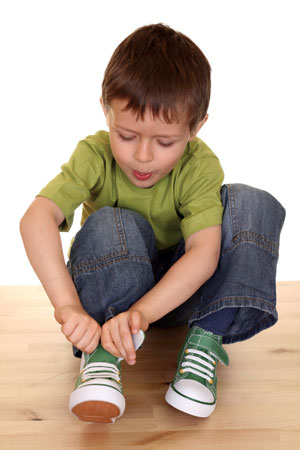 “I’ll do it myself!” What parent hasn’t heard that from their preschooler? Of course, it’s usually when you’re in a hurry and just don’t have the extra 20 minutes it takes for Jacob to put on his own shoes and socks. So you help him — this time. But experts say you should be prepared to encourage him the next time he wants to exert his independence.
“I’ll do it myself!” What parent hasn’t heard that from their preschooler? Of course, it’s usually when you’re in a hurry and just don’t have the extra 20 minutes it takes for Jacob to put on his own shoes and socks. So you help him — this time. But experts say you should be prepared to encourage him the next time he wants to exert his independence.
“It takes more time in the beginning to teach independence, but in the long run, it benefits both child and parents,” says Diane Kinder, Ph.D., a professor in the education program at the University of Washington’s Tacoma campus. One great way to encourage that can-do spirit is to give kids age-appropriate chores.
The importance of chores
Teaching children how to perform some basic cooking tasks can be fun (and also helpful) as you prepare dinner. Kids can measure, mix salads and make simple dishes like “ants on a log” — celery stalks spread with peanut butter and sprinkled with raisins.
“If there’s a pet in the house, your child can fill the water bowl and feed the pet,” says Kinder. But besides just getting a task completed, cultivating independence boosts your child’s self-esteem and encourages maturity.
“Your child develops a sense of pride when he accomplishes something,” says Christine Kim, education director at The Goddard School, a national child-care franchise in Redmond. When your child is proud of what he’s done, Kim says, he’s going to be happier, and that leads to a better experience in school.
When kids get frustrated
As soon as your preschooler shows signs of frustration with the activity he’s attempting, Kinder says, you should consider whether it’s time to redirect him to something easier. “For instance, tying shoes is very hard,” says Kinder. “When your child gets frustrated, tell him, ‘You did a great job, and we’ll come back to that later.’ This is a great learning opportunity for parents. Decide if maybe you’re pushing too much on him all at once and haven’t broken the task down enough.”
Acknowledging your child’s frustration and helping him work through it is the best remedy, says Kim. “Don’t just take over,” she says.
In some cases, encouraging a child to just hang in there is best. “If a child is learning to ride a bike, have him get back on that bike. Teach him persistence and walk him through how it’s done. Provide the minimum support that he needs for success.”
It’s OK for the parent to help if the child is very frustrated, because you want them to try again, according to Shauna Barison, owner of The Goddard School. “Just make it a positive takeover and say something like, ‘I know that next time you do this, we’ll be closer to succeeding.’”
When parents get frustrated
Sometimes, it’s the parents who frustrate easily, but you should show your child that it’s OK that they didn’t get the task perfect this time. “Parents need to slow down and not rush their kids,” says Barison. “Everything they learn will be with the child for the rest of his life, so give him the opportunity to learn.”
Barison is one of those neat and orderly parents who likes everything in its place, so she’s had to learn to step back and let her children be independent. She doesn’t tell them that they did something wrong or punish them for spilling, for instance. “Spilling happens as they are learning and improving their motor skills,” says Barison.
 Encouraging your child
Encouraging your child
Make sure you let your child know he’s done a good job with what he did manage to get done and that you recognize that he is trying his best. Encouragement is paramount for success when handing over some independence to your child.
“Don’t ever let your child feel like a failure,” says Barison. “Children place so much value on what their parents, teachers and older siblings think about them. They shouldn’t feel discouraged over mistakes.”
When you praise your kids, they learn that they can praise others, too, and that helps create a positive atmosphere.
Have patience and take a step back when the child is struggling, says Kim. It’s his job to learn these things, and those brand-new skills always take a little longer.
Heather Larson, who lives in Tacoma, frequently writes about parenting and health topics for a variety of publications.











